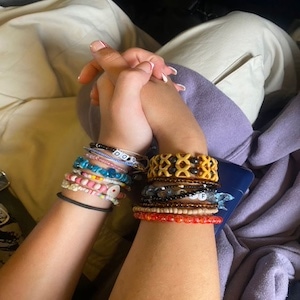September 2001
The first day of kindergarten was gorgeous. The sun in the sky had the kind of fresh vigor that could draw even the hardest-working New Yorkers out of their cramped cubicles, workrooms, and store aisles and into the light, if only for a moment. By all accounts, it was a warm summer day, not at all different from any sunny day in July or August—green grass, green leaves, prancing dogs, sparkling fountains, flowers bursting out of the plant shops in vivid colors. The only hint of the winter to come was a faint touch of crispness in the wind. It was the wind of change—not that anyone knew that at the time.
Outdoor recess was especially boisterous that day. Excited by new faces in the warm sunshine, the kindergarteners were full of energy. Most of them took it out on their legs, running in dizzying circles around the playground, or on each other, screaming with joy or anger or sadness. But not everyone. One little girl in particular was very calm.
Regina Shalhoub sat in the sandbox, thinking blissfully of nothing but the sandcastle right in front of her. At just five years old, Gina already had incredible focus. If she was interested in something, she could easily fix all of her attention on that one thing and block out everything else. Her sandcastle was one such thing; she had spent the first ten minutes of recess completely unaware of anything beyond the kingdom she was creating with her hands. But Gina’s kingdom was not long for this world. Soon enough, a bigger, stronger kid had run over and shoved her, face first, into her labor of love.
It was probably the loss of her sandcastle, and not the fact that the boy who’d shoved her and all his friends were now taking turns throwing clumps of sand at her, that prompted Gina to start bawling.
And it was in this dark moment that Rose Duckworth laid eyes on Gina for the first time.
Rosie might have been standing on the complete other side of the playground, but that did not stop her from running over to the commotion. Even then, she had a strong sense of justice, and it only took her a fraction of a second to realize what was happening. In fact, she had a much keener understanding of it than Gina, who was too baffled by the boys’ cruelty to do anything other than mourn for her lost kingdom. The boys, meanwhile, her mortal enemies, were having a good time.
“What’s wrong with you!” Rosie shouted as she ran over. The boys ignored her, so she got in between them and Gina, hoping to face them in the full wrath of justice. The biggest boy, the one who had pushed Gina, tried to brush Rosie aside, not so much to hurt Rosie as to continue his war on Gina’s kingdom. But Rosie was stronger. One gentle push in self-defense, and the boy was sprawled out on his back in the sand.
Unfortunately, the boy—years later, neither Rosie nor Gina would remember his name, although Gina’s mother certainly always would—was a clever bully. He started wailing so loudly that even Gina stopped what she was doing (crying) for a moment to stare at him in horror.
“Hey, hey, hey!” A teacher came running over. “What’s going on?”
The other bullies had scattered, leaving Rosie standing in the sandbox between two crying children. She realized this looked bad. Looking the teacher staunchly in the face, she tried to explain that violence was, in fact, necessary at times if it gave you the means to rescue a vulnerable young peer. That is to say, the ends outweighed the means. Unfortunately, she was unable to express it as eloquently as it had sounded in her head.
The teacher looked at Gina. She was weeping in the sand, her thick curls chock full of the stuff. The teacher then looked at the bully, who was kicking his legs, stirring up clouds of dust and sand, and screaming his lungs out. The teacher tried to remind herself that she liked this job, that unpleasant days like this one could not deter her from her calling.
She ended up calling the parents of all three problem children.
By the time her parents arrived, Gina’s tears were long dry. They found her seated next to Rosie on a bench in the hallway, giggling as Rosie drew pictures on a borrowed notepad of whatever Gina asked her for. A unicorn, a dragon, a princess—every one of Gina’s girlish fantasies came to life through Rosie’s skill, which was quite remarkable for her age. If not for the sand in her hair and fingernails and ears, Gina probably would have forgotten all about her lost kingdom by that point. Seeing the fallen blades of grass scattered around them, the teacher scolded them both, then looked apologetically at Gina’s parents. There was obvious relief on their faces. Their daughter was okay.
After some discussion with the teacher—none of which Gina and Rosie payed any attention to—Gina’s mom took her hand. “It’s time to go, Gina.”
Gina was actually having fun, but she was and had always been an exceptionally obedient girl. She hopped off the bench and turned back to look at her new friend.
“Say bye to your friend,” said Gina’s dad.
All of a sudden, both of them felt very shy. Neither of them were the type to take to new people very quickly. But Gina raised her hand and smiled. Rosie did the same.
“Bye.”
“Bye!”
Never before had Rosie ever smiled in quite the way she smiled at Gina right then.
And Gina, in turn, felt a rush of something that her five-year-old heart could certainly withstand, but perhaps not fully understand.










Comments (0)
See all